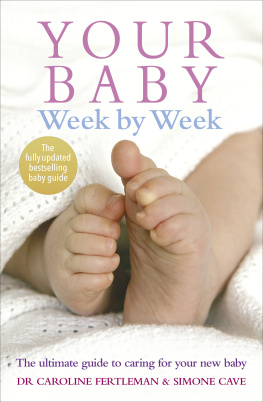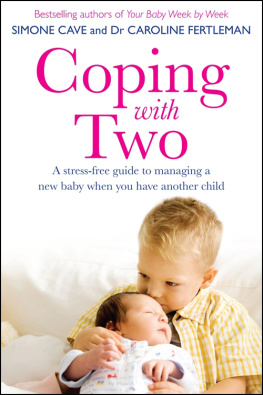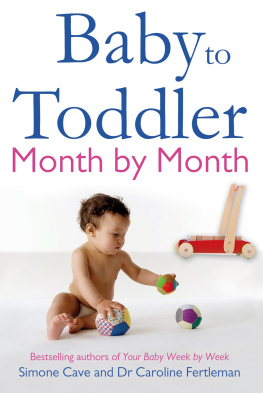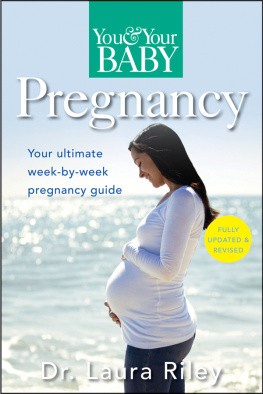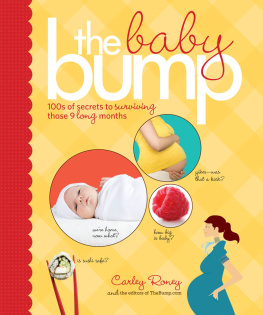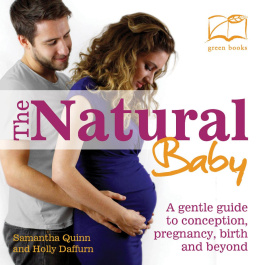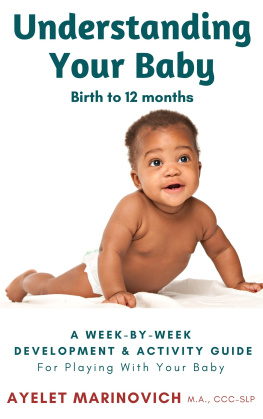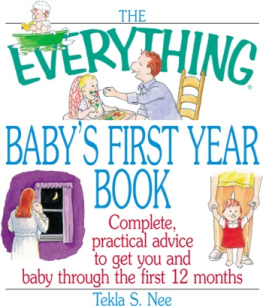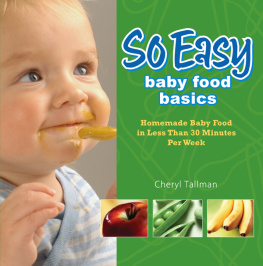contents
About the Book
The first six months with a new baby is a special and exciting time full of milestones and new experiences. This updated edition of Your Baby Week by Week explains the changes that your baby will go through in their first six months. Each chapter covers a week of their development so youll know when your baby will start to recognize you, when theyll smile and laugh for the first time and even when theyll be old enough to prefer some people to others!
Paediatrician Dr Caroline Fertleman and health writer Simone Caves practical guide provides reassuring advice so you can be confident about your babys needs. Including:
- - How to tell if your baby is getting enough milk
- - Spotting when you need to take your baby to the doctor
- - Identifying why your baby is crying
- - How long your baby is likely to sleep and cry for
- - Tips on breastfeeding and when to wean your baby
Full of all the information and tips for every parent Your Baby Week by Week is the only guide youll need to starting life with your new arrival.
About the Author
Caroline Fertleman
Dr Caroline Fertleman is Consultant Paediatrician at the Whittington Hospital, London, and is Honorary Senior Lecturer at the Royal Free Hospital and University College London Medical School. She lives in London with her husband and three children.
Simone Cave
Simone Cave was health editor at the Daily Mirror for six years, prior to which she was a freelance journalist covering health and medical issues for national newspapers and magazines.
To all the babies whose parents have already benefited from this book and to those who will do in the future
introduction
EVERYONE TELLS YOU babies dont come with a manual. Well, maybe theyre wrong because here it is. Weve written Your Baby Week by Week to gently guide you through the incredible first six months of your babys life. We aim to hold your hand during those stressful times when every cry will set your heart racing, and every snuffle will send you running to the doctor.
Of course, we understand parents are hungry for facts about their newborns: why are they awake most of the night, is their poo normal, and are they feeding properly? And yet we also realise how exhausted youll be feeling. Even finding time to eat breakfast can be a struggle, so doing in-depth research on jaundice is the last thing youll feel like. This is why weve given you all the facts youll need for each week in the first six months of your babys life and presented them in a simple, easy-to-follow format. Each chapter is broken into clear sections covering a full range of practical issues, from sleeping and crying, to nappies and when to call a doctor.
Beginning with week 0 when your baby is first born, we explain everything from how many wet nappies you can expect over 24 hours to how long your baby may sleep and cry for. Weve tried to describe every possible event that can occur in that first week so have included detailed information about your midwifes visits, how to spot if your baby is dehydrated, and whether hes feeding properly. Weve even put in a Whats happening to mum section which tells you, among other things, which day the baby blues are likely to kick in. In this updated edition, weve also added in an Easing into parenthood section in some chapters, with practical tips for both parents. This comprehensive detail continues throughout the book and each chapter tells you what you need to know for a particular week.
Youll notice we always refer to your baby in this book as he. This is simply because we, the authors, have six children between us, four of which are boys. We could just as easily have said she and probably would have done if wed had more daughters. In our book Baby to Toddler Month by Month, which follows on from this one, we refer to your child as she.
We know small groups of parents with babies the same age gather up and down the country earnestly comparing notes about their babies. So weve given this book the reassuring voice of a good friend who is also an experienced mum, a consultant paediatrician, and just happens to have a baby who was born in the same week as yours.
THE PHILOSOPHY
While researching this book we noticed baby experts fall into two main groups. There are those who recommend a strict routine with regular feeding and sleeping times, and those who emphasise the importance of following your babys demands by ignoring the clock and letting your baby do what he wants to. Both of these approaches have a lot of advantages and disadvantages which is why weve taken a middle-of-the-road, best-of-both-worlds approach. But its important to point out babies change so rapidly during the early months that guidance needs to adapt quickly too. Advice thats relevant for a two-week-old isnt necessarily suitable for a baby whos six weeks old. And this is where giving week-by-week advice comes into its own.
For example, during the first few weeks you definitely need to take more of an earth mother approach, cuddling and feeding your baby around the clock. This is crucial to his development and it can actually be dangerous to only feed your baby at regular intervals at this stage because he could well end up dehydrated. Caring for your baby in this way allows you to be disorganised and chaotic in the early weeks, which will reduce your stress considerably. But if you continue this very relaxed, unstructured approach, you may find yourself exhausted if, at six weeks, your baby is still demanding to be fed every hour and refuses to sleep unless hes in your arms. Thats why weve included a step-by-step sleep programme, giving tips relevant to a particular week, to help you eventually get your baby sleeping through the night by six months.
Weve also explained how to get your baby into a routine, but our approach is both gentle and realistic weve made plenty of allowances for problems such as colic and unusually difficult babies. And throughout the book weve offered trouble-shooting advice to help you identify the exact reason why your baby may not be feeding or sleeping as expected.
Weve strived against telling you what to do or giving hard and fast instructions and instead have adopted a gentler, advisory approach after all, hes your baby. A parents instinct is extremely strong, and our intention is not to counter this but to reinforce it with the appropriate facts and information to give you the confidence to do what you know to be best for your baby.
HOW TO GET THE MOST OUT OF THIS BOOK
We know youre busy and tired, so weve made it easy for you to find the information you need. Obviously, you read the week appropriate to your babys age, beginning with week 0 when hes born, week 1 when hes a week old, and so on. And youll probably find yourself flicking through to future weeks to discover what lies ahead. Once your baby is born you probably wont be able to study this book from cover to cover though of course if youre reading it during pregnancy theres no reason why you cant use it to prepare yourself for parenthood.

